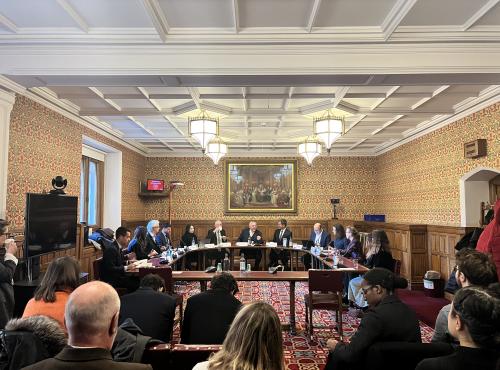Devolving data offers a promising start - but more detail is required on the ambition of the Levelling Up White Paper
Data is a powerful tool to tackle major societal challenges. The All-Party Parliamentary Group for Data Analytics is pleased to see recognition of this potential in the recent Levelling Up White Paper. The group also welcomes announcements towards more place-based decision-making on data. Further detail will be required to fully deliver on the ambitions of the white paper, as outlined by Eve Lugg, Policy Manager for Data at Policy Connect.
After attending the conservative party conference in autumn last year, I highlighted the undeniable optimism that underpinned the government’s policies.
Six months on, we have seen how that confident and positive attitude has led to an ambitious white paper that sets out the intention to “transform the (UK’s government’s) approach to data and evaluation to improve local decision-making”.
Place-based decision making is key for data use and governance. We welcome the regional focus and intention to devolve more powers to local bodies in the white paper.
The All-Party Parliamentary Group for Data Analytics’ (APGDA) report Our Place, Our Data called for national governments to support local government and their place-based partners so that data collation and use can be improved.
Data has the power to transform lives and local areas. These innovations require increased oversight and accountability to strengthen transparency for local citizens.
An earlier APGDA report titled Trust, Transparency and Tech (TTT), set out the need for a consistent and long-term direction of travel, driven forward by an independent body. We are pleased to see the plans for establishing an independent body to focus on data, transparency and evidence.
The body will aim to:
-
Empower citizens with information about their local area;
-
Input into service design;
-
Strengthen local leaders’ knowledge of their services, enabling them to share best practice;
-
Increase central government’s understanding of local government; and
-
Enable the sector support to be better tailored.
Our Place, Our Data also set out the need for greater citizen involvement in developing data-driven strategies. We therefore welcome the intention for the new independent data body to be co-designed with local government.
It is pleasing to see the white paper include public metrics that will track local authorities progress and success in levelling.
The focus on measurement and data should help focus policy and encourage accountability, but the government should ensure its targets are appropriate. Additional detail is required to understand the extent to which the metrics used are localised to reflect the communities within specific London authorities. However, we are hopeful that this is a step towards increasing citizen engagement and involvement.
As the white paper looks to address some of society’s biggest challenges, it is clear that a new independent body will not be the only focus for data in levelling up.
The increasing value of good data across all sectors demonstrates that data will be essential going forward. This will help identify opportunities to reduce the inequalities and gaps between the most and least prosperous regions in the UK.
High-quality and comparable data is key for the development of skills. It can produce information on local skills demand, future skills needs of business, the skills available in an area and the pathways between training and good jobs.
We are pleased to see the Department for Education’s intentions to set up a new Unit for Future Skills which will work with BEIS and DWP to bring together skills data and information held across government.
This will help identify the skills gaps in different industries and the type of education and training that should be made available in different areas of England to contribute to the levelling up agenda. The Education and Skills team at Policy Connect have more to say on this.
Developing the skills agenda is last week's announcement of the new drive to improve the digital skills of thousands of people across the Humber through a new Local Digital Skills Partnership.
Since the launch of the National Data Strategy Forum last year, we have discussed the implications of the data revolution on the UK workforce.
Every worker will soon need a basic level of data literacy to operate. Those in data-specific roles must be able to make the best use of data opportunities that appear as the digital industry progresses.
It is great to see that digital skills are being addressed in line with mission one of the NDS, “unlocking the value of data”. Skills within the workforce and the general population must be prioritised to enable all to experience the true benefits of data.
The overall adjustments to decision-making becoming more place-based are welcomed.
However, the tests of real change lie in how these developments are implemented and funded. If done so effectively, and with considerations highlighted above, the proposed developments hold promise in reducing the imbalances across the United Kingdom.





